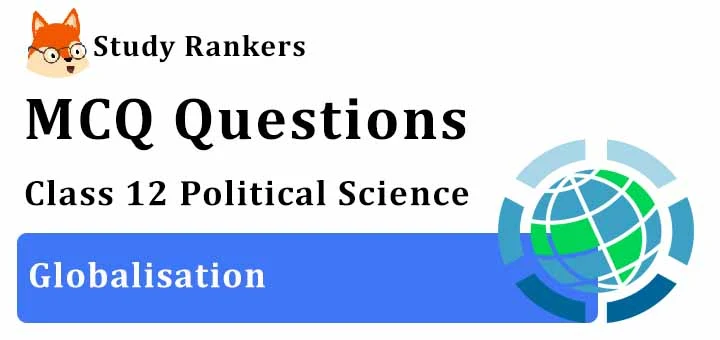MCQ Questions for Class 12 Political Science: Ch 9 Globalisation

1. Globalization has led to the flow of ideas across
(a) National boundaries.
(b) State.
(c) Political parties.
(d) Different planets.
► (a) National boundaries.
2. With the globalisation of markets, the tastes and preferences of consumers world-wide are
(a) Becoming similar to the tastes and preferences of American consumers.
(b) Being encouraged by multinational organizations to become increasingly similar.
(c) So different that they can be ignored by international organizations.
(d) Converging upon a global norm.
► (d) Converging upon a global norm.
3. According to the rightist view in India, globalisation tends to
(a) Benefits the weaker section of the society.
(b) Divides the State into rich and poor.
(c) Weakens the State.
(d) Reduces political party competition.
► (c) Weakens the State.
4. The seventh WSF meeting was held in:
(a) Delhi, January 2007
(b) Nairobi, January 2007
(c) Islamabad, January 2007
(d) New York, January 2007
► (b) Nairobi, January 2007
5. Which of the following is available in India due to globalisation?
(a) Foreign TV channels
(b) Coca Cola and Pepsi
(c) Sansui brand of electronics
(d) All of the above
► (d) All of the above
6. India implemented the New Economic Policy in the year
(a) 1980.
(b) 1981.
(c) 1990.
(d) 1991.
► (d) 1991.
7. This type of globalisation refers to global markets and the flow of capital, technology & goods is
(a) Political globalisation.
(b) Cultural globalisation.
(c) Economic globalisation.
(d) Opposing globalisation.
► (c) Economic globalisation.
8. In 1986-87, the overall fiscal deficit of India touched an all time high of
(a) 5% of GDP.
(b) 7% of GDP.
(c) 9% of GDP.
(d) 10% of GDP.
► (c) 9% of GDP.
9. During the colonial period, India became an
(a) importer of primary goods and raw materials
(b) exporter of finished goods and also raw materials.
(c) exporter of primary goods and importer of raw materials.
(d) exporter of primary goods and raw materials.
► (d) exporter of primary goods and raw materials.
10. Liberalisation means:
(a) integration among economies.
(b) reduced government controls and restrictions.
(c) policy of planned disinvestments.
(d) competitive market.
► (b) reduced government controls and restrictions.
11. Which of the statements are true about the impact of globalisation?
(a) Globalisation has been uneven in its impact on states and societies.
(b) Globalisation has had a uniform impact on all states and societies.
(c) The impact of globalisation has been confined to the political sphere.
(d) Globalisation inevitably results in cultural homogeneity.
► (a) Globalisation has been uneven in its impact on states and societies.
12. Which of the statements are true about globalisation?
(a) Globalisation is only about movement of commodities.
(b) Globalisation does not involve a conflict of values.
(c) Services are an insignificant part of globalisation.
(d) Globalisation is about worldwide interconnectedness.
► (d) Globalisation is about worldwide interconnectedness.
13. Which of the statements are true about globalisation?
(a) Globalisation is purely an economic phenomenon.
(b) Globalisation began in 1991.
(c) Globalisation is the same thing as westernisation.
(d) Globalisation is a multidimensional phenomenon.
► (d) Globalisation is a multidimensional phenomenon.
14. Which of the statements are true about the causes of globalisation?
(a) Technology is an important cause of globalisation.
(b) Globalisation is caused by a particular community of people.
(c) Globalisation originated in the US.
(d) Economic interdependence alone causes globalisation.
► (a) Technology is an important cause of globalisation.
